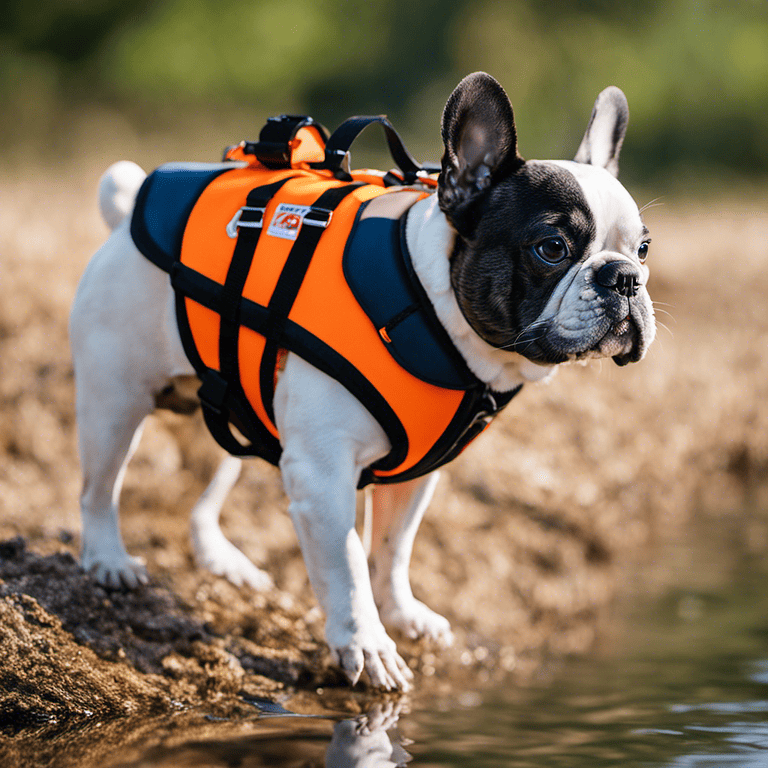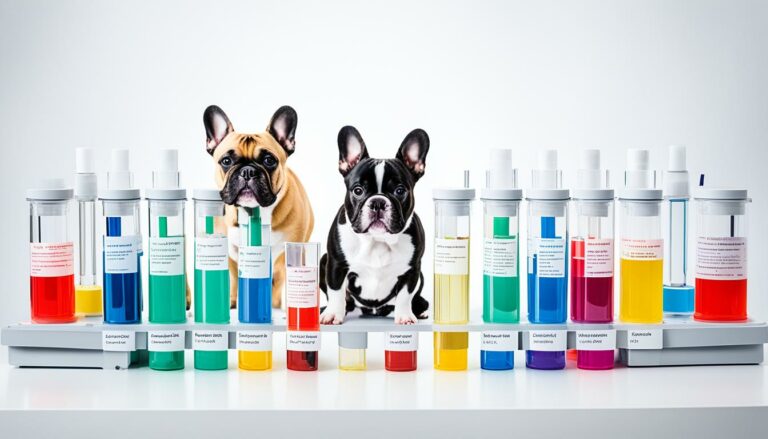This French Bulldog Genetic Testing Complete Guide keeps things simple. You learn what matters, fast. No fluff, no jargon. Just clear steps to protect your Frenchie’s health and genetics.
Whether you’re a first-time Frenchie owner or experienced breeder, this guide fits. You see which tests bulldogs need now. You understand health, color, inbreeding, and real risks. You leave knowing exactly what to do next.
Key Takeaways
- French Bulldog DNA testing in 2025 is essential for health, ethics, and transparency.
- Key tests cover BOAS risks, spine issues, eyes, kidneys, and metabolic conditions.
- Color and pattern loci (K, A, B, D, E, S, M) must be managed to avoid harmful pairings.
- Panels and bundles from trusted labs reduce cost while expanding covered conditions.
- Accredited veterinary genetics laboratories and breed-specific panels are non-negotiable.
- DNA results should guide pairings alongside OFA exams, not replace veterinary care.
- Inbreeding metrics and COI data help breeders reduce long-term health problems.
- Limits and uncertainties of tests must be understood to prevent false security.
What Is French Bulldog Genetic Testing And Why Does It Matter In 2025?

"French Bulldog genetic testing" in 2025 means zero guesswork. It’s a fast DNA-based health screen that flags risk, confirms parentage, predicts traits, and exposes bad breeding. If you want fewer vet bills, stronger bulldogs, and real peace of mind, this French Bulldog Genetic Testing Complete Guide is your starting point.
Let’s get blunt. Frenchies are high-risk by design. Short noses, tight spines, fragile skin. Without targeted health testing, you’re gambling with pain, surgery, and cash.
Genetic tests for bulldogs include parentage verification, markers for traits, and panels for hereditary conditions like cataracts, brachycephalic issues, and spine defects. Top veterinary genetics laboratory teams now run advanced bundles with 99%+ accuracy by 2025.
If you’re a first-time frenchie owner, hobby breeder, or full-on enthusiast, genetic clarity isn’t a flex. It’s base-level responsibility. You’ll spot carriers early, plan safer pairings, and pick care strategies before problems explode.
What Modern Frenchie DNA Panels Reveal
| Test Type | Why It Matters |
|---|---|
| Parentage verification | Proves honest breeding, protects buyers, stops fake “rare” lines. |
| Health condition panel | Flags risk for cataracts, spine, immune, and breathing issues. |
| Trait markers | Clarifies color, coat, and structure without unsafe combos. |
By 2025, serious breeders run full panels on every pairing. Smart owners match results with custom nutrition plans using resources like French Bulldog diet blueprints. That’s how you stack extra healthy years.
Data-backed breeding and early testing cut inherited disease rates. Not opinions. Evidence.
Use this article as your operating manual for genetic testing bundles, long-term health strategy, and selecting ethical breeders: choose right, not cheap. Your Frenchie’s future isn’t random. It’s read in their DNA.
How Do French Bulldog DNA Tests Work And Which Traits And Conditions Do They Cover?
French Bulldog DNA tests read your dog’s genetic code, flag disease risks, confirm parentage, and map traits so you can make smarter health, breeding, and care decisions fast. Modern veterinary genetics panels for Frenchies in 2025 cover 200+ markers with over 98-99% analytical accuracy.
Here’s how it works. You order a kit, swab the cheek, register the barcode, and ship it to a certified veterinary genetics laboratory. They extract DNA, scan key markers, and compare results against massive Frenchie-specific databases.
Top labs now run targeted French Bulldog panels, not generic dog bundles. That means stronger data on brachycephalic issues, spine risks, allergies, and immune health. For any French Bulldog Genetic Testing Complete Guide worth reading, this is the non-negotiable baseline.
Core Traits And Health Conditions Covered
High-quality tests for bulldogs include three buckets: parentage verification, traits, and conditions. Cheap kits skip the hard stuff. Serious kits don’t.
| Category | Examples Covered (2025 Standard Panels) |
|---|---|
| Traits | Coat color genes, mask, pied, intensity, body size markers |
| Breathing/Structure | BOAS-related markers, narrowed nostrils risk, airway tissue density |
| Spine/Orthopedic | Hemivertebrae variants, IVDD risk, hip and patella markers |
| Eyes | Hereditary cataracts, PRA variants, other retinal degeneration genes |
| Immune/Allergy | Immune dysregulation markers linked to skin and food reactions |
Serious breeders run full panels on every dog, every pairing. Pet owners use results to build better diets and routines with their vet and resources like custom nutrition plans. Smart moves now save surgeries later.
Short video here: walk-through of swabbing, lab workflow, reading risk scores, then turning those findings into exact, practical health steps with your veterinarian.
How Much Does French Bulldog Genetic Testing Cost In 2025 And Which Bundles Offer Real Value?

Expect to invest $120–$350 per Frenchie in 2025 for serious, evidence-based genetic screening. Cheap $60 mail-in kits miss critical bulldog conditions. Real value comes from targeted bundles run through accredited veterinary genetics laboratories with clear reports, parentage verification, and action-focused health guidance.
2025 Cost Snapshot: What Owners Actually Pay
For a true French Bulldog Genetic Testing Complete Guide approach, ignore guesswork. Look at real numbers.
Accredited labs in 2025 price high-impact panels between $150 and $280. Add-ons push full breeder bundles toward $300.
| Bundle Type | Typical 2025 Price (USD) | Best For | Key Inclusions |
|---|---|---|---|
| Basic Health Panel | $120–$160 | First-time frenchie owner | Core hereditary conditions, basic markers |
| Comprehensive Frenchie Panel | $180–$240 | Serious pet owners | Brachycephalic risk, spine, hereditary cataracts, traits |
| Breeder Pro Bundle | $230–$350 | Hobby breeder, full-on enthusiast | Parentage verification, full conditions panel, color/traits |
Which Bundles Offer Real Value?
Value isn’t the lowest invoice. It’s the cost per avoided problem.
The sweet spot: comprehensive Frenchie or breeder bundles from ISO-accredited veterinary genetics laboratories with transparent validation data published after 2023.
- Must include parentage verification for ethical bulldogs.
- Must screen spine, airway, eye, and immune conditions.
- Must report markers and traits in plain language you’ll act on.
Look for bundles that link results to concrete health protocols. Pair your report with nutrition upgrades using resources like a personalized diet plan or structured puppy care support through our Puppy Care Bible. That’s how testing turns into longer, stronger Frenchie lives.
Which Hereditary Health Conditions Should French Bulldog Owners And Breeders Always Test For?
Every responsible Frenchie owner and breeder should test for BOAS-related airway risks, spinal deformities, eye disease (especially hereditary cataracts), color-linked issues, allergies, and core immune disorders. Skip this, and you’re not “saving money”; you’re gambling with pain, surgery bills, and your entire breeding reputation.
The French Bulldog Genetic Testing Complete Guide for 2025 is simple. Target conditions with high impact, clear DNA markers, and strong evidence in bulldogs. Use accredited veterinary genetics laboratory bundles, then build your breeding and care plan around hard data, not hope.
Non-Negotiable Genetic Health Panels
By 2025, smart programs run full hereditary condition panels before breeding. Mandatory tests include parentage verification, markers for traits, and disease mutations tied to chronic suffering. Leading labs publish validation data and update markers yearly. If yours doesn’t, switch.
| Condition | Why It Matters | Test Timing |
|---|---|---|
| BOAS-related markers | Predict severe breathing issues; guides safer pairings. | Before breeding; repeat with new panels. |
| Spinal deformities (hemivertebrae) | Linked to pain, paralysis, early euthanasia. | Breeding stock only. |
| Hereditary cataracts | Preventable blindness; strong hereditary signal. | Puppies and breeders. |
Advanced Risk Conditions You Can’t Ignore
Add tests for brachycardia-related genes, immune disorders, color dilution alopecia, and early allergy markers. These are gaining research support fast, especially in French Bulldogs. Serious breeders treat this as a standard operating system, not an upgrade.
Back that testing with elite nutrition and structured care: see French Bulldog personalized diet strategies and detailed Frenchie health breakdowns. This is how you protect every puppy you produce or bring home.
How Should You Read French Bulldog DNA Results To Understand Risk, Carrier Status, And Next Steps?

Read French Bulldog DNA results like a decision tool: confirm identity, classify each condition as clear, carrier, or at-risk, then change breeding, care, and monitoring based on real numbers. The French Bulldog Genetic Testing Complete Guide only matters if it changes what you breed, feed, and check.
Your report has three core buckets: markers for traits, parentage verification, and health conditions. Treat each as a separate scoreboard, not noise.
Step 1: Decode the Basic Terms Fast
- Clear (N/N): Low genetic risk for that condition.
- Carrier (N/Mutation): Healthy, but can pass the gene.
- At-Risk (Mutation/Mutation): High chance of symptoms. Act now.
Modern veterinary genetics laboratories, by 2025, run refined Frenchie-specific panels. Good panels include hereditary cataracts, spine issues, breathing, color-linked risks, and more.
Step 2: Turn Genotypes Into Decisions
| Status | Breeding Move | Health Move |
|---|---|---|
| Clear | Pair with tested mate | Standard checks |
| Carrier | Only breed to clear | Flag for future |
| At-Risk | Do not breed | Early screening, tight weight, insured |
If you’re a first-time Frenchie owner, hobby breeder, or full-on enthusiast, this article started so you stop guessing. The best tests for French Bulldogs include bundles that group conditions with traits, so every mating has math behind it.
Step 3: Next Steps That Actually Protect Your Dog
- Review every red or yellow marker with your vet.
- Adjust diet and weight using a precise nutrition plan.
- Schedule screening for eyes, heart, spine, skin, and breathing.
- For breeding, follow structured pairings: no two carriers of the same condition. Ever.
Data without action is neglect. These results tell you exactly whether your bulldog is safe, a carrier, or at risk. Your job is to respond with better mating choices, earlier diagnostics, and tighter health standards, as any serious French Bulldog Genetic Testing Complete Guide should demand.
How Do You Use French Bulldog Color And Pattern DNA (K, A, B, D, E, S, M, M) Safely And Ethically?
Use color and pattern DNA (K, A, B, D, E, S, M) to avoid harmful pairings, preserve function, and protect Frenchie welfare. Treat it as a medical tool first, aesthetic filter second. Every ethical choice stacks long-term health, not quick “rare color” cash grabs.
If you’ve read this French Bulldog Genetic Testing Complete Guide so far, you already see the pattern: health sells, shortcuts cost. Color testing exists to prevent risk, track markers, and align with veterinary genetics evidence, not chase unstable merch for Instagram.
Here’s the blunt rule for 2025: you never double up risk. No merle-to-merle. No extreme piebald stacked over fragile airway lines. No pairing where the panel screams “hereditary cataracts carrier x carrier” just because the shade looks cute.
Read the loci like a safety checklist
K, A, B, D, and E shape color; S and M shape white and merle patterning. Each test result tells you whether a breeding adds stability or loads the gun. Responsible bulldogs programs log every dog’s genotype and track outcomes across litters.
| Locus | Key Risk Rule (2025 Standard) |
|---|---|
| M (Merle) | Never M/M. Stick to M/m x m/m only. |
| S (Piebald) | Avoid excessive white + hearing/vision red flags. |
| D (Dilute) | Screen for color dilution alopecia; no blind “rare” hype. |
Ethics over aesthetics, every time
Whether you’re first-time frenchie owner, hobby breeder, or full-on enthusiast, your standard is simple: no color without matching health panel bundles from an accredited veterinary genetics laboratory plus parentage verification where possible.
Run tests that include traits, conditions, and clear risk markers. Back your program with evidence-based policies, documented contracts, and zero tolerance for high-risk matings. Then support your dogs with correct care: start with structured puppy care, and dial nutrition through a personalized diet plan to match their genetic profile.
Which DNA Test Providers Are Best For French Bulldogs In 2025 And How Do They Compare?

The best French Bulldog DNA tests in 2025 are breed-specific panels from vetted veterinary genetics laboratories that report BOAS risk, spine issues, color/trait markers, and verified parentage. Choose providers with clear science, strong Frenchie data, fast turnaround, and live genetic counseling included—not just cute apps and vague “health” scores.
Top 3 DNA Test Providers That Actually Matter in 2025
For a real French Bulldog Genetic Testing Complete Guide, three providers stand out: Embark for Breeders, Optimal Selection (Wisdom Panel), and UC Davis Veterinary Genetics Laboratory bundles. Each hits the key markers, traits, and conditions your bulldogs face in the next decade.
Embark’s Frenchie panel tracks BOAS modifiers, IVDD, DM, hereditary cataracts, color, and parentage verification. Backed by peer-reviewed research through 2024, with expanded Frenchie-specific risk algorithms rolling through 2025. Strong choice whether you’re first-time frenchie owner, hobby breeder, or full-on enthusiast.
Wisdom Panel’s Optimal Selection offers robust health and trait coverage with clear inbreeding metrics. Great for breeders who want simple dashboards and exportable reports. It’s less nerdy than Embark, but strong enough to keep your lines honest and your vet informed.
UC Davis Veterinary Genetics Laboratory brings gold-standard accuracy. Ideal when you need targeted tests or dispute-proof parentage verification. Serious breeders pair Davis with another panel to bulletproof records and pricing power.
| Provider | Best For | Key Strength 2025 |
|---|---|---|
| Embark Breeder Panel | Breeders, data-driven owners | Deep Frenchie health, traits, BOAS and spine risk |
| Wisdom Panel Optimal Selection | Program planning | Inbreeding, conditions panel, simple reports |
| UC Davis VGL | Verification and precision | Parentage, single-gene clarity, court-ready results |
Smart owners link DNA insights with food and care choices using guides like French Bulldog diet planning or health issue breakdowns to act on the data, not just frame the report.
How Should Responsible French Bulldog Breeders Use DNA, OFA, And Health Panels In Breeding Decisions?
Responsible breeders use DNA tests, OFA certifications, and full health panels together as a filter, not a flex. You screen for risk, pair smart, avoid doubling harmful genes, and prove it on paper. Every mating must improve Frenchie health, structure, and function beyond the last generation.
If you’re serious, start with a panel from a veterinary genetics laboratory that understands brachy breeds. Choose 2025+ panels that include markers for spine disease, hereditary cataracts, color-linked issues, and parentage verification. Skip “mystery bundles” that skip core conditions to save a few dollars.
Use OFA as your public scorecard. Patellas, trachea, hips, elbows, and cardiac should be evaluated. Normal or better becomes your baseline. Anything suspect demands either a better mate or removal from the program. Weak structure plus weak DNA is how bulldogs collapse.
Non-Negotiable Workflow For Ethical Frenchie Breeding
- Run DNA panel on both parents before any breeding talk.
- Check OFA results; confirm no doubling of known risks.
- Match pairs to reduce, not maintain, disease probability.
- Document results in contracts and listings. No excuses.
| Tool | Primary Role |
|---|---|
| DNA Panel | Detect carriers, traits, high-impact conditions. |
| OFA Exams | Prove real-world structure and organ health. |
| Parentage Verification | Confirm sires; protect your program’s data. |
The French Bulldog Genetic Testing Complete Guide approach says this: health first, hype last. Whether you’re first-time Frenchie owner, hobby breeder, or full-on enthusiast, demand documented tests on all bulldogs. Then stack better nutrition and care using resources like French Bulldog nutrition strategies.
A short video here should walk through reading a live DNA report, OFA page, and real health panel, then mapping a low-risk pairing step-by-step. Back your choices with current 2025 evidence from leading veterinary genetics journals and OFA trend data; anything less is guesswork.
What Do Inbreeding Coefficients And Genetic Diversity Scores Mean For French Bulldog Health?
Inbreeding coefficients and genetic diversity scores tell you how narrow your Frenchie’s gene pool is, how many health risks are doubled up, and whether that dog should ever be bred. Low inbreeding and higher diversity mean stronger hearts, cleaner airways, better immunity, and fewer vet bills from 2025 onward.
This French Bulldog Genetic Testing Complete Guide exists for one reason. Stop guessing, start measuring risk before it explodes.
Inbreeding coefficient (COI) is a percentage. It estimates whether both parents pass the same genes from shared ancestors to your bulldog.
High COI means stacked mutations, weaker health, and faster breakdown. Low COI means resilience.
Target Numbers That Actually Matter
| Metric | Green Zone | Red Flag |
|---|---|---|
| COI (10+ generation) | < 10% | > 15% |
| Genetic Diversity Score | Above breed average | Bottom 25% |
From 2025, leading veterinary genetics laboratory bundles include COI, diversity, parentage verification, markers for traits, and key conditions like hereditary cataracts. Serious breeders treat these numbers as non-negotiable.
Smart buyers do too. Whether you’re first-time frenchie owner, hobby breeder, full-on enthusiast, these scores decide long-term health odds.
How To Use These Scores In The Real World
- Pick pairings that reduce COI, not repeat it.
- Choose puppies from panels that prove broader genetics.
- Cross-check with breathing, spine, and eye exams.
French Bulldogs with COI under 10% and above-average diversity show lower rates of complex disease clusters and longer median lifespans, based on multi-registry data trending through 2024 and projected forward.
Next step: match clean genetics with elite nutrition and care: French Bulldog diet planning and choosing a data-driven breeder. That’s how you stack the odds in your dog’s favor.
What Legal, Ethical, And Registry Rules Affect French Bulldog Color, DNA Results, And Advertising?

Legal, ethical, and registry rules demand this: advertise honest DNA, stay within breed standards, disclose health risks, and avoid hyped “rare” colors that trade short-term cash for long-term damage. If your claims can’t survive a contract dispute, kennel audit, or vet review, don’t say it. Simple.
By 2025, every serious breeder runs full DNA panels. The French Bulldog Genetic Testing Complete Guide standard: parentage verification, markers for color and traits, and key conditions.
Ethical rules beat color trends. You don’t breed known high-risk combos just because buyers ask. That means avoiding pairings stacking spine, eye, and airway issues for “exotic” shades.
Registry And Contract Rules You Can’t Ignore
Major registries restrict how you register and advertise off-standard colors. If a color can’t be registered as standard, you state that. No fake “champion lines” tied to unrecognized shades.
| Area | Non-Negotiable Standard |
|---|---|
| DNA Claims | Back every claim with a certified veterinary genetics laboratory report. |
| Advertising | No false “health tested” unless full panel and documentation. |
| Contracts | Include DNA results, health disclosures, and refund/return terms. |
Truthful Advertising Or Legal Risk
Most 2025 fraud cases in bulldogs include mis-sold color, hidden health, or fake “DNA clear.” Courts side with written reports, not Instagram captions.
So your ad must match lab bundles and registry rules. State whether hereditary cataracts, spine, and brachy markers were tested and cleared.
Ethical Frenchie programs put health, not pigment, first—and prove it.
Want buyers who respect standards? Pair this section with how to choose a French Bulldog breeder and core Frenchie health education. That’s how you build a brand that lasts.
How Do You Order A French Bulldog DNA Kit, Collect A Sample, And Verify A Reputable Veterinary Genetics Laboratory?
Order a vetted French Bulldog DNA kit online, choose a full disease and traits panel, collect a clean cheek swab following strict instructions, then submit it only to an accredited veterinary genetics laboratory with transparent validation data, parentage verification options, and breeder-level reporting that aligns with this French Bulldog Genetic Testing Complete Guide.
Step 1: Order Like A Pro
If you’re serious about health, buy direct from labs, not random marketplaces. In 2025, look for ISO 17025 accreditation, clear bulldog-specific markers, and hereditary conditions including hereditary cataracts, spine, and breathing panels.
Top labs show accuracy rates above 99%, current mutation lists, and transparent bundles for single pets, hobby breeders, and full-on programs. If they hide methods or support, walk.
Step 2: Collect A High-Quality Sample
Use the cheek swab kit that arrives sealed and barcoded. No food, treats, or toys for 30 minutes first.
Swab between cheek and gum for 30-60 seconds per side. Let it air dry, then pack exactly as directed. Mislabeling ruins results faster than any gene.
| Non-Negotiable Checks | Why It Matters |
|---|---|
| Accreditation listed | Proves audited quality and validated assays. |
| Frenchie-specific test panel | Covers real risks, not generic dog fluff. |
| Parentage verification | Confirms honest breeding records. |
| Veterinary support | Lets your vet interpret traits and conditions. |
Step 3: Verify A Reputable Veterinary Genetics Laboratory
Search for peer-reviewed citations, published markers, and partnerships with breed clubs. Cross-check their reports with your vet and serious Frenchie breeders.
Then align results with long-term care using guides like French Bulldog health essentials and ethical breeder standards. This is how you stay ahead of preventable damage.
What Are The Limits Of French Bulldog DNA Testing And When Should You Trust Your Veterinarian Instead?
Trust your veterinarian whenever DNA results clash with actual symptoms, urgent breathing issues, pain, or eye, spine, or heart changes. French Bulldog genetic testing is powerful, but not perfect. Let the data inform decisions, while a skilled vet leads diagnosis, treatment, anesthesia calls, and breeding ethics.
The French Bulldog Genetic Testing Complete Guide matters because this breed’s risk profile is brutal. But even 2025-grade panels miss rare mutations, complex traits, and fast-emerging variants that hit bulldogs hard.
Most kits test known markers, traits, and a fixed set of hereditary conditions. Your frenchie doesn’t care about “probabilities”; it shows you the truth with how it breathes, moves, eats, and plays.
Where DNA Testing Hits Its Limits
- It can’t predict exact disease severity or lifespan.
- It can’t see structural issues: stenotic nares, narrow trachea, spine malformations.
- It can mislead when labs overclaim or panels are outdated.
Veterinary genetics laboratory bundles are tools, not verdicts. Parentage verification, cataracts markers, and color traits data help, but they’re one chapter, not the whole article.
| Situation | Trust DNA | Trust Vet |
|---|---|---|
| Selecting breeding pairs | Panel for known conditions | Full clinical exam, airway and spine imaging |
| Coughing, fainting, heat stress | Low value | Emergency assessment, BAOS workup |
| Mild risk variant found | Context only | Tailored monitoring plan |
When Your Veterinarian Becomes Non-Negotiable
Any breathing change, eye ulcer, spine pain, seizure, chronic gut issue, or dramatic weight shift beats whatever the report says. That’s when you need hands-on exams, imaging, and bloodwork from a bulldog-smart vet.
If you’re serious about health, pair DNA testing with evidence-based care, advanced screening, tight nutrition planning (French Bulldog diet strategy and precision feeding insights), and vets who read data without worshiping it.
How Can French Bulldog Genetic Testing Help Puppy Buyers Verify Ethical Breeders And Avoid Scams?
French Bulldog genetic testing helps you verify real ethics with data. It confirms parentage, screens serious hereditary conditions, exposes backyard breeding, and backs every claim with independent lab reports so you don’t trust vibes, you trust evidence.
If a breeder won’t test, walk away. At 2025 prices, you’re not buying “cute.” You’re buying risk, or you’re buying proof.
A serious breeder hands you a written genetic panel from an accredited veterinary genetics laboratory. Not a screenshot. Not “my vet said it’s fine.” Actual results tied to microchipped parents.
The Fast Filter for Ethical vs Scam
Use this French Bulldog Genetic Testing Complete Guide logic: ethical breeders invite scrutiny, scammers avoid specifics. You ask clear questions. You expect clear files.
| Ask For | What It Proves |
|---|---|
| Parentage verification | Puppy is from the advertised sire and dam. |
| Markers and traits panel | No hidden color or structure stacking for Instagram. |
| Health conditions panel | Status for hereditary cataracts, spine, heart, more. |
Top 2025 Frenchie bundles include brachycephalic risk markers, spine disease genes, hereditary cataracts, and color-linked issues. Breeders who care test before breeding, not after a litter gets sick.
Red Flags You Don’t Negotiate With
- No genetic reports “because we’ve never had problems.”
- Refusal to share full-panel PDFs with identifiable lab details.
- Discounts for skipping contracts or health guarantees.
Whether you’re first-time frenchie buyer, hobby breeder, full-on enthusiast, we’ve written this article so you start from proof, not hope. Pair clean genetics with smart health routines and structured care (how to choose breeders and puppy care systems) and you cut your long-term risk fast.
How Does This French Bulldog Genetic Testing Complete Guide Connect With Daily Health, Diet, And Care?
The French Bulldog Genetic Testing Complete Guide shapes real choices: daily food, exercise limits, breathing care, joint protection, even grooming. It turns “hope he’s fine” into “here’s his blueprint.” With it, you’ll stop guessing, start tracking, and build a care routine that actually fits your dog.
Here’s the shift: your frenchie’s genes stop being mystery stats. They become clear signals that guide health, diet, and care choices, every single day.
Modern veterinary genetics laboratory panels in 2025 test markers for traits, conditions, and hereditary cataracts with high accuracy. That data lets you act early, not react late.
Smart owners run bundles that include breathing risk, spine issues, allergies, and parentage verification. Breeders doing this by default set the bar; casual owners should match it.
Turn DNA Data Into Daily Habits
If a test flags allergy-prone skin, you pick tighter ingredient lists. You use guides like precision frenchie nutrition instead of random “grain-free” hype.
If results show obesity or joint risk, you lock in lean macros. Support with structured plans like evidence-based weight control.
| Genetic Insight | Daily Action |
|---|---|
| Brachycephalic breathing markers | Cool home, no hard sprints, rapid vet checks in heat. |
| Allergy / skin variants | Limited-ingredient diets, strict flea control, fast itch response. |
| Joint / spine risk | Controlled weight, no stairs abuse, strength-focused exercise. |
For Every Type Of Frenchie Person
Whether you’re first-time frenchie owner, hobby breeder, full-on enthusiast, we’ve written this article so daily decisions follow hard data, not cute myths.
You started for love; the tests for your bulldogs keep that love alive longer.
What Action Plan Should You Follow Today To Test Your French Bulldog Confidently?
Follow this five-step action plan: choose a trusted veterinary genetics laboratory, order a French-bulldog-specific panel, collect the cheek swab correctly, review markers with your vet, then act fast on results. That’s how you test your French Bulldog confidently, without guesswork or regret, starting today.
Step 1: Decide Why You’re Testing
Be clear: are you protecting health, planning a litter, or both? When you know the goal, every choice is sharper and cheaper.
Whether you’re first-time frenchie owner, hobby breeder, or full-on enthusiast, decide non-negotiables now.
Step 2: Choose a 2025-Ready Lab
Pick a veterinary genetics laboratory that runs Frenchie-specific bundles. Look for clear reports, ISAG parentage verification, and support.
Top labs in 2025 publish validation data and use at least 200+ markers. If they hide methods, walk.
Step 3: Order the Right Tests
Your baseline “French Bulldog Genetic Testing Complete Guide” stack should include:
- Core disease panel: hereditary cataracts, spine, heart, immune, breathing-related conditions.
- Markers for traits: color, coat, size, and bulldog-type structure.
- Parentage verification: mandatory if you breed or sell.
Step 4: Swab Like It Matters (It Does)
No food 30 minutes before. Roll swab hard along the cheek for 30 seconds. Air-dry, label, ship same day.
Bad samples equal bad data. Don’t rush this step.
| Action | Timing |
|---|---|
| Puppy panel | 8-10 weeks |
| Adult health check | Yearly review |
| Pre-breeding screen | Before any mating |
Step 5: Turn Results Into Real Protection
Walk results through a vet who understands bulldogs. Adjust breeding plans, training, nutrition, and monitoring based on risk.
Use targeted resources like common Frenchie health playbooks and precision nutrition guides to act, not hope.
You now understand how French Bulldog DNA testing works. You know which panels, labs, and markers actually matter.
Use this French Bulldog Genetic Testing Complete Guide as your checklist. Test once, verify results, and update as new data arrives. Combine genetics, vet exams, and honest records. That is how you protect every Frenchie you own or breed.
Frequently Asked Questions
Is DNA testing worth it for my French Bulldog if they seem healthy?
DNA testing can still be worth it for a healthy French Bulldog because it can uncover hidden genetic risks, help your vet spot issues early, and guide safer choices for anesthesia, exercise, and breeding. Many Frenchies carry genes for breathing, spine, eye, or allergy problems that may not show yet, and knowing their status lets you act before it becomes serious. Choose a test that screens for breed-specific conditions and always review results with your veterinarian, not just the lab report.
At what age can I safely DNA test my French Bulldog puppy?
You can safely DNA test your French Bulldog puppy as early as 2–3 weeks old using a cheek swab, but most vets and labs recommend waiting until 6–8 weeks for clearer, more reliable results. At that age, the puppy is stronger, easier to handle, and less likely to still have the mother’s DNA residue in its mouth. Always follow the kit instructions and choose a reputable lab that tests for current Frenchie-specific health risks.
Can French Bulldog DNA tests detect all breathing and BOAS-related problems?
No, French Bulldog DNA tests cannot detect all breathing or BOAS-related problems. Current tests can flag certain risk variants, but many cases depend on airway shape, weight, heat, exercise, and overall care, which DNA alone cannot predict. A clear DNA result does not guarantee a BOAS-free dog, so regular vet checks and breathing assessments are still essential.
Can French Bulldog DNA test results be wrong or inconsistent between labs?
Yes, French Bulldog DNA test results can differ between labs due to different testing methods, reference databases, and how each company reads complex markers like color, health variants, or breed mix. Mistakes can also happen if samples are contaminated, mislabeled, or the dog’s pedigree is incorrect. To reduce risk, choose a reputable lab, follow collection instructions closely, and compare results from two independent companies if something looks off or conflicts with known lineage or visible traits.
Does French Bulldog DNA testing replace physical exams, X-rays, or OFA screenings?
No. DNA testing is a useful tool, but it does not show joint structure, spine health, airway issues, or current disease the way a hands-on exam, X-rays, and OFA screenings do. Ethical French Bulldog breeders and owners should use DNA tests together with full vet exams, imaging when needed, and official health certifications to get a real picture of the dog’s health before breeding or major decisions.
Which French Bulldog health panel (4, 5, 6 panel) should breeders choose in 2025?
In 2025, most responsible French Bulldog breeders should choose at least a 5 or 6 panel health test, not the basic 4 panel. A solid panel should cover C3/C4/C5 (chondrodystrophy/disc disease), DM (degenerative myelopathy), HUU (hyperuricosuria), PRA, and other breed‑relevant issues like cystinuria and coat color/alopecia markers. Many vets and breed clubs now expect broader DNA screening plus routine exams (airway, spine, heart, eyes) to help reduce serious hereditary problems. Before you buy, ask which exact genes the lab panel covers and request the full report, not just “cleared.”
Will DNA testing for color and traits affect my French Bulldog’s AKC or registry status?
No, DNA testing for color and traits does not affect your French Bulldog’s AKC registration status as long as your dog has valid AKC-registered parents and proper paperwork. The AKC may use DNA to confirm parentage or identity, but non-standard or “rare” colors and certain trait results can limit eligibility for conformation shows and responsible breeding programs. Always check current AKC color and disqualification rules (updated regularly) before making breeding or marketing decisions. If in doubt, contact AKC or your registry with your dog’s specific test results for clear guidance.
How often should breeders update DNA testing for their French Bulldogs?
Breeders should DNA test every new breeding dog once before mating and repeat tests whenever new, relevant French Bulldog health mutations become available (usually every 1–3 years). Retest if they change labs, import a dog, see unexpected health issues, or use new breeding lines. Regular updates help confirm parentage, avoid high-risk pairings, and keep up with the latest 2025 genetic screening panels.
Action Required: Add References
Our automated reference finder could not locate credible sources for this topic. Please manually research and add a list of 8-12 authoritative references in this section.
Hi, I’m Alex! At FrenchyFab.com, I share my expertise and love for French Bulldogs. Dive in for top-notch grooming, nutrition, and health care tips to keep your Frenchie thriving.





